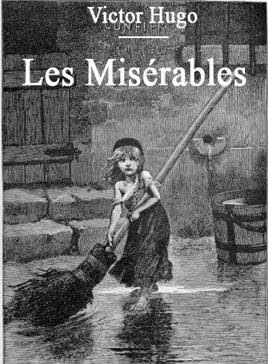
"Certainly they appeared utterly depraved, corrupt, vile and odious; but it is rare for those who have sunk so low not to be degraded in the process, and there comes a point, moreover, where the unfortunate and the infamous are grouped together, merged in a single, fateful word. They are les misérables - the outcasts, the underdogs."
Victor Hugo's Les Misérables is at once an intimate story centering on a small cast of characters and more than a few coincidences, and a sprawling epic that takes as its subject the whole of France and the complexities of revolution. It focuses primarily on Jean Valjean, a convict turned hero several times over who spends the novel changing identities and eluding capture by the relentless Inspector Javert. The story also involves Cosette, the girl Valjean raises as a daughter, and Marius, a young idealist with whom Cosette falls in love. Long before they meet Cosette and Marius have a connection, though neither knows it: a man named Thénardier is believed to have rescued Marius' father after the Battle of Waterloo - a debt the elder Pontmercy is never able to repay and thus bequeaths to his son - and is the same man who abused young Cosette before she was rescued by Valjean. Like Valjean, Thénardier and his family change their identities whenever the walls are closing in, but unlike Valjean they live lives of disrepute, stealing and taking advantage of others. In the streets of Paris and beyond, these characters weave in and out of each others lives.
The story unfolds over a seventeen year period and against the backdrop of the events leading up to the June Revolution of 1832, in which both Marius and Valjean participate (though for very different reasons). The story is staggeringly ambitious and Hugo is meticulous when it comes to the details, no matter how small. This is somewhat problematic in that the minor tangents Hugo follows slows the flow of the story and presents unwanted distractions from the main thrust of the narrative. The characters are so well drawn and their struggles are so compelling that to be brought so deep into their experiences only to suddenly be confronted with, say, several chapters devoted to the history of the Paris sewers, is really disruptive. It isn't a big enough flaw to detract from the ultimate greatness of the novel, but it's a flaw nevertheless.
What really works in favour of Les Misérables is how thoroughly Hugo brings his characters to life. Valjean, in particular, and the moral struggles that he endures as he tries to live a good life and atone for past sins, is a character so totally fleshed out that he may very well walk off the page and into reality. Here, the details serve Hugo well, because without characters the reader comes to care about so much, the story would simply be a collection of historical facts strung together. It's much more than that, however, which is why the story is still so widely celebrated and continues to live on through countless adaptations on stage and screen. This is the kind of novel the word "classic" was made for.
No comments:
Post a Comment